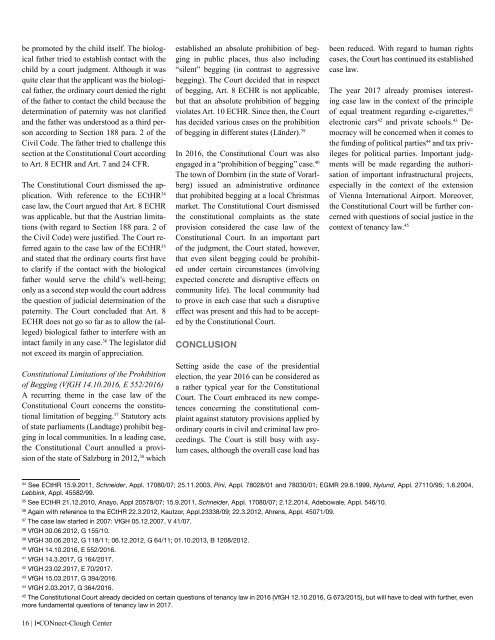2016 Global Review of Constitutional Law
I-CONnect–Clough Center collaboration.
I-CONnect–Clough Center collaboration.
You also want an ePaper? Increase the reach of your titles
YUMPU automatically turns print PDFs into web optimized ePapers that Google loves.
e promoted by the child itself. The biological<br />
father tried to establish contact with the<br />
child by a court judgment. Although it was<br />
quite clear that the applicant was the biological<br />
father, the ordinary court denied the right<br />
<strong>of</strong> the father to contact the child because the<br />
determination <strong>of</strong> paternity was not clarified<br />
and the father was understood as a third person<br />
according to Section 188 para. 2 <strong>of</strong> the<br />
Civil Code. The father tried to challenge this<br />
section at the <strong>Constitutional</strong> Court according<br />
to Art. 8 ECHR and Art. 7 and 24 CFR.<br />
The <strong>Constitutional</strong> Court dismissed the application.<br />
With reference to the ECtHR 34<br />
case law, the Court argued that Art. 8 ECHR<br />
was applicable, but that the Austrian limitations<br />
(with regard to Section 188 para. 2 <strong>of</strong><br />
the Civil Code) were justified. The Court referred<br />
again to the case law <strong>of</strong> the ECtHR 35<br />
and stated that the ordinary courts first have<br />
to clarify if the contact with the biological<br />
father would serve the child’s well-being;<br />
only as a second step would the court address<br />
the question <strong>of</strong> judicial determination <strong>of</strong> the<br />
paternity. The Court concluded that Art. 8<br />
ECHR does not go so far as to allow the (alleged)<br />
biological father to interfere with an<br />
intact family in any case. 36 The legislator did<br />
not exceed its margin <strong>of</strong> appreciation.<br />
<strong>Constitutional</strong> Limitations <strong>of</strong> the Prohibition<br />
<strong>of</strong> Begging (VfGH 14.10.<strong>2016</strong>, E 552/<strong>2016</strong>)<br />
A recurring theme in the case law <strong>of</strong> the<br />
<strong>Constitutional</strong> Court concerns the constitutional<br />
limitation <strong>of</strong> begging. 37 Statutory acts<br />
<strong>of</strong> state parliaments (Landtage) prohibit begging<br />
in local communities. In a leading case,<br />
the <strong>Constitutional</strong> Court annulled a provision<br />
<strong>of</strong> the state <strong>of</strong> Salzburg in 2012, 38 which<br />
established an absolute prohibition <strong>of</strong> begging<br />
in public places, thus also including<br />
“silent” begging (in contrast to aggressive<br />
begging). The Court decided that in respect<br />
<strong>of</strong> begging, Art. 8 ECHR is not applicable,<br />
but that an absolute prohibition <strong>of</strong> begging<br />
violates Art. 10 ECHR. Since then, the Court<br />
has decided various cases on the prohibition<br />
<strong>of</strong> begging in different states (Länder). 39<br />
In <strong>2016</strong>, the <strong>Constitutional</strong> Court was also<br />
engaged in a “prohibition <strong>of</strong> begging” case. 40<br />
The town <strong>of</strong> Dornbirn (in the state <strong>of</strong> Vorarlberg)<br />
issued an administrative ordinance<br />
that prohibited begging at a local Christmas<br />
market. The <strong>Constitutional</strong> Court dismissed<br />
the constitutional complaints as the state<br />
provision considered the case law <strong>of</strong> the<br />
<strong>Constitutional</strong> Court. In an important part<br />
<strong>of</strong> the judgment, the Court stated, however,<br />
that even silent begging could be prohibited<br />
under certain circumstances (involving<br />
expected concrete and disruptive effects on<br />
community life). The local community had<br />
to prove in each case that such a disruptive<br />
effect was present and this had to be accepted<br />
by the <strong>Constitutional</strong> Court.<br />
CONCLUSION<br />
Setting aside the case <strong>of</strong> the presidential<br />
election, the year <strong>2016</strong> can be considered as<br />
a rather typical year for the <strong>Constitutional</strong><br />
Court. The Court embraced its new competences<br />
concerning the constitutional complaint<br />
against statutory provisions applied by<br />
ordinary courts in civil and criminal law proceedings.<br />
The Court is still busy with asylum<br />
cases, although the overall case load has<br />
been reduced. With regard to human rights<br />
cases, the Court has continued its established<br />
case law.<br />
The year 2017 already promises interesting<br />
case law in the context <strong>of</strong> the principle<br />
<strong>of</strong> equal treatment regarding e-cigarettes, 41<br />
electronic cars 42 and private schools. 43 Democracy<br />
will be concerned when it comes to<br />
the funding <strong>of</strong> political parties 44 and tax privileges<br />
for political parties. Important judgments<br />
will be made regarding the authorisation<br />
<strong>of</strong> important infrastructural projects,<br />
especially in the context <strong>of</strong> the extension<br />
<strong>of</strong> Vienna International Airport. Moreover,<br />
the <strong>Constitutional</strong> Court will be further concerned<br />
with questions <strong>of</strong> social justice in the<br />
context <strong>of</strong> tenancy law. 45<br />
34<br />
See ECtHR 15.9.2011, Schneider, Appl. 17080/07; 25.11.2003, Pini, Appl. 78028/01 and 78030/01; EGMR 29.6.1999, Nylund, Appl. 27110/95; 1.6.2004,<br />
Lebbink, Appl. 45582/99.<br />
35<br />
See ECtHR 21.12.2010, Anayo, Appl 20578/07; 15.9.2011, Schneider, Appl. 17080/07; 2.12.2014, Adebowale, Appl. 546/10.<br />
36<br />
Again with reference to the ECtHR 22.3.2012, Kautzor, Appl.23338/09; 22.3.2012, Ahrens, Appl. 45071/09.<br />
37<br />
The case law started in 2007: VfGH 05.12.2007, V 41/07.<br />
38<br />
VfGH 30.06.2012, G 155/10.<br />
39<br />
VfGH 30.06.2012, G 118/11; 06.12.2012, G 64/11; 01.10.2013, B 1208/2012.<br />
40<br />
VfGH 14.10.<strong>2016</strong>, E 552/<strong>2016</strong>.<br />
41<br />
VfGH 14.3.2017, G 164/2017.<br />
42<br />
VfGH 23.02.2017, E 70/2017.<br />
43<br />
VfGH 15.03.2017, G 394/<strong>2016</strong>.<br />
44<br />
VfGH 2.03.2017, G 364/<strong>2016</strong>.<br />
45<br />
The <strong>Constitutional</strong> Court already decided on certain questions <strong>of</strong> tenancy law in <strong>2016</strong> (VfGH 12.10.<strong>2016</strong>, G 673/2015), but will have to deal with further, even<br />
more fundamental questions <strong>of</strong> tenancy law in 2017.<br />
16 | I•CONnect-Clough Center


